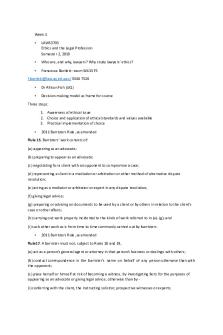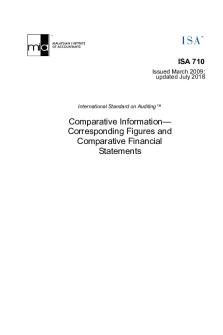Summary of ISA 200 - Lecture notes 1 PDF

| Title | Summary of ISA 200 - Lecture notes 1 |
|---|---|
| Author | J K |
| Course | Auditing |
| Institution | Edinburgh Napier University |
| Pages | 1 |
| File Size | 63.4 KB |
| File Type | |
| Total Downloads | 99 |
| Total Views | 131 |
Summary
Auditing and assurance...
Description
Summary of ISA 200
200 series: General principles and responsibilities ISA 200 Overall Objectives of the Independent Auditor and the Conduct of an Audit in Accordance with International Standards on Auditing Objectives of the auditor [11]:
To obtain reasonable assurance about whether the financial statements as a whole are free from material misstatement, whether due to fraud or error.
To express an opinion on whether the financial statements are prepared, in all material respects, in accordance with an applicable financial reporting framework.
To report on the financial statements, and communicate as required by the ISAs, in accordance with the auditor's findings.
Responsibilities of management [A2]:
Preparation of the financial statements in accordance with the applicable financial reporting framework, including their fair presentation.
Internal control necessary to enable preparation of financial statements that are free from material misstatement, whether due to fraud or error.
To provide the auditor with: o
Access to all information relevant to the preparation of the financial statements
o
Unrestricted access to persons from within the entity from whom the auditor determines it necessary to obtain evidence.
Risk:
Audit: the risk of issuing an inappropriate opinion. [13c]
Inherent: the susceptibility of an assertion about a class of transaction (e.g. revenue) or account balance (e.g. receivables) to material misstatement before the consideration of any related internal controls. [13ni]
Control: the risk that material misstatement will not be prevented, detected or corrected by entity's internal control. [13nii]
Detection: the risk that audit procedures do not detect material misstatements. [13e]
An auditor must perform the audit with professional scepticism: an attitude that includes a questioning mind, being alert to conditions which indicate possible misstatement due to error or fraud, and a critical assessment of audit evidence. [13l] Inherent limitations of audit [A47]: Audit evidence is persuasive rather than conclusive because of:
The nature of financial reporting
The nature of audit procedures
The need to conduct audit a within reasonable time and at reasonable cost....
Similar Free PDFs

MIA ISA 200 - article
- 24 Pages

ASA 200 - Lecture notes 1
- 32 Pages

ISA 5 - Lecture notes 2
- 48 Pages

ISA 200 spiegazione e note
- 6 Pages

Summary of lecture notes
- 4 Pages

ISA 710 - Lecture notes 3
- 19 Pages

PVC - 200 - Lecture notes 2
- 1 Pages

CMPSC 200 Lecture 03 notes
- 3 Pages

PSY 200 Notes Exam 1
- 12 Pages
Popular Institutions
- Tinajero National High School - Annex
- Politeknik Caltex Riau
- Yokohama City University
- SGT University
- University of Al-Qadisiyah
- Divine Word College of Vigan
- Techniek College Rotterdam
- Universidade de Santiago
- Universiti Teknologi MARA Cawangan Johor Kampus Pasir Gudang
- Poltekkes Kemenkes Yogyakarta
- Baguio City National High School
- Colegio san marcos
- preparatoria uno
- Centro de Bachillerato Tecnológico Industrial y de Servicios No. 107
- Dalian Maritime University
- Quang Trung Secondary School
- Colegio Tecnológico en Informática
- Corporación Regional de Educación Superior
- Grupo CEDVA
- Dar Al Uloom University
- Centro de Estudios Preuniversitarios de la Universidad Nacional de Ingeniería
- 上智大学
- Aakash International School, Nuna Majara
- San Felipe Neri Catholic School
- Kang Chiao International School - New Taipei City
- Misamis Occidental National High School
- Institución Educativa Escuela Normal Juan Ladrilleros
- Kolehiyo ng Pantukan
- Batanes State College
- Instituto Continental
- Sekolah Menengah Kejuruan Kesehatan Kaltara (Tarakan)
- Colegio de La Inmaculada Concepcion - Cebu






